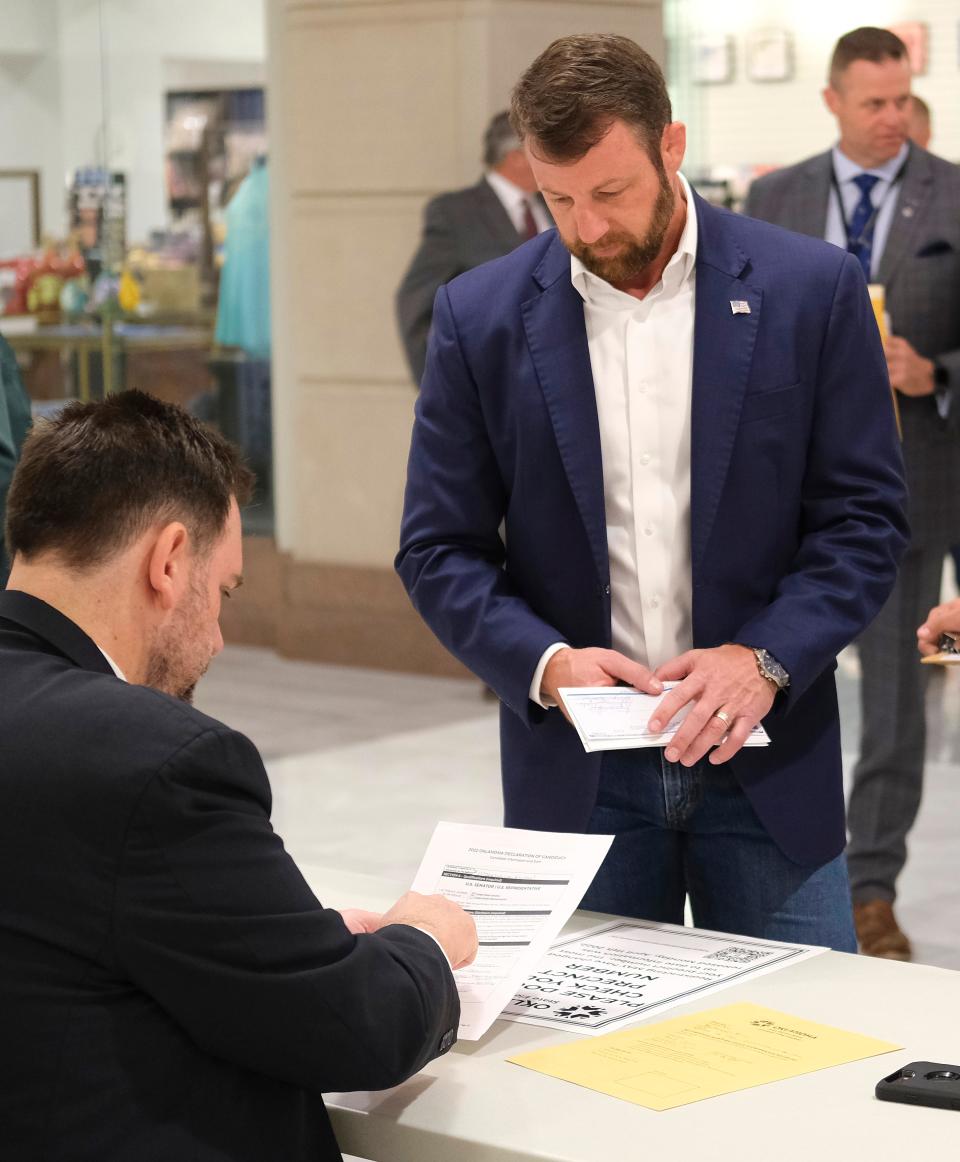White House hits back at Markwayne Mullin, Kevin Hern over loan criticism
- Oops!Something went wrong.Please try again later.
- Oops!Something went wrong.Please try again later.
The White House struck back on Thursday against two Oklahoma congressmen who criticized student loan forgiveness after accepting taxpayer aid for their businesses during the pandemic.
The White House posted messages on Twitter about how much money the businesses of Reps. Markwayne Mullin and Kevin Hern received from the Paycheck Protection Program after the two Republicans tweeted their criticism of President Joe Biden’s plan to reduce or eliminate some student debt.
Mullin, of Westville, escalated the fight Thursday night, calling the president “a career politician who has never created a single job.”
On Wednesday, Mullin joined many Republican lawmakers in using Twitter to slam the action taken by Biden to reduce student debt.
“We do not need farmers and ranchers, small business owners, and teachers in Oklahoma paying the debts of Ivy League lawyers and doctors across the U.S.,” Mullin said in his tweet.

More:Mullin won't commit to debate Kendra Horn or support Mitch McConnell
“This places undue burden on those already suffering due to the weight of Biden’s failed economic policy.”
On Thursday, the White House responded, “Congressman Markwayne Mullin had over $1.4 million in PPP loans forgiven.”
The reference was to the Paycheck Protection Program loans received by Mullin’s plumbing and services businesses. According to a database created by ProPublica, a non-profit journalism organization, Mullin companies received $1.45 million in PPP loans that have been forgiven.
Late Thursday, Mullin responded to the White House on Twitter, saying, “Another ignorant attack from a career politician who has never created a single job. 74 days before midterms, Joe Biden is targeting business owners for protecting their employees from government lockdowns. President Trump always supported American workers and job creators.”
In Oklahoma, at least some Mullin company workers would have been shielded from Gov. Kevin Stitt’s emergency orders since essential services like plumbing were exempt.
The Paycheck Protection Program was part of the pandemic relief approved by Congress in the initial wave of the pandemic. About $800 billion was allocated through banks to businesses to keep them solvent during mandated closures and the economic slowdown. Loans under the program were forgiven if recipients abided by the rules.
At least a dozen members of Congress had interests in companies that received PPP loans, according to media reports. The rules were changed for later loans to bar members of Congress and their spouses from receiving them.
Hern, R-Tulsa, received a $1.08 million loan for the company, KTAK, that owned five McDonald’s fast food franchises. That loan was forgiven. Hern has since sold the restaurants.
Separately, a company co-owned by Hern’s wife, Custom Seating Inc., in Muskogee, borrowed $804,206 from the Paycheck Protection Program, for payroll at the 47-employee business. That loan, along with about $5,000 in interest, was forgiven in late 2020. A second loan, of $771,693, was approved for the company in January, 2021 and forgiven last September.
Hern tweeted on Wednesday, “To recap, in the last two weeks, the ‘Party of the People’ has supercharged the IRS to go after working-class Americans, raised their taxes, and forced them to pay for other people's college degrees.”
The White House responded on Thursday, “Congressman Kevin Hern had over $1 million in PPP loans forgiven.”
Hern's office did not provide a comment on Friday regarding the White House tweet.
The White House responded also responded on Twitter to other Republican lawmakers who had criticized the student loan forgiveness after taking PPP money, including Reps. Marjorie Taylor Green, of Georgia, who received $183,000, and Vern Buchanan, of Florida, who received $2.3 million.
Equivalencies were made between student loans and PPP loans almost immediately after Republicans began criticizing Biden’s plan, though some lawmakers pushed back to contend the PPP was structured to save millions of jobs in an economic crisis and was designed to allow forgiveness.
Florida Sen. Marco Rubio, a Republican, said Friday that he co-authored the Paycheck Protection Program “to create a federal grant for small businesses to keep their employees on payroll. This payroll grant, structured deliberately as a forgivable loan, had one key condition: that 80% of the funds go to payroll.”
At a White House briefing on Friday, Bharat Ramamurti, director of the National Economic Council of the United States, said the comparison between student loans and PPP loans was a fair one. He said more than $350 billion in PPP loans had already been forgiven and that Republicans had pressured the administration to act faster to forgive the loans.
“Our view is: Why is there a double standard here?” Ramamurti said. “Why is it − from the perspective of Republicans − great to forgive a loan of up to $10 million to a business owner, but if we want to provide $10,000 or $20,000 in loan relief to a teacher or a bus driver or a nurse, all of a sudden it’s socialism? That’s what doesn’t compute from our view.”
Meanwhile, supporters of Biden’s plan have hit back at Republican claims that the student loan forgiveness would help wealthy people, saying that the plan was aimed at helping individuals with incomes below $125,000 and couples with incomes below $250,000. Ramamurti said most of the forgiveness would go to people making less than $75,000 a year.
Ramamurti said the Biden plan would cost taxpayers about $24 billion each year for the next 10 years. That is far less than estimated by the Penn Wharton business model at the University of Pennsylvania, which estimated the Biden plan would cost at least $600 billion and up to $1 trillion, depending on assumptions.
The Congressional Budget Office has not released a cost estimate of Biden's plan, though the Penn Wharton business model at the University of Pennsylvania estimates a cost over $600 billion.
This article originally appeared on Oklahoman: White House hits back at Markwayne Mullin, Kevin Hern over PPP loans

